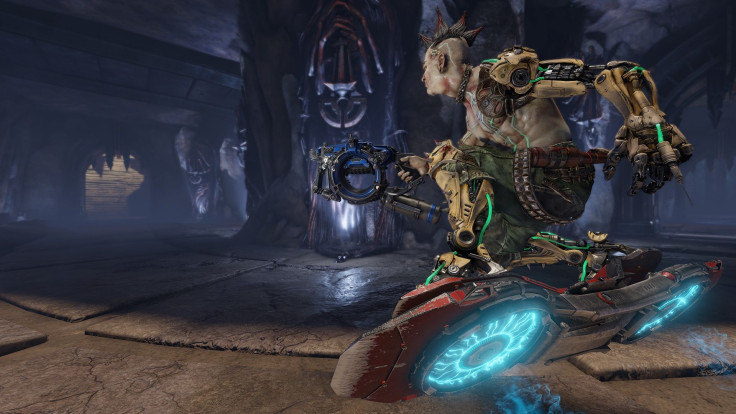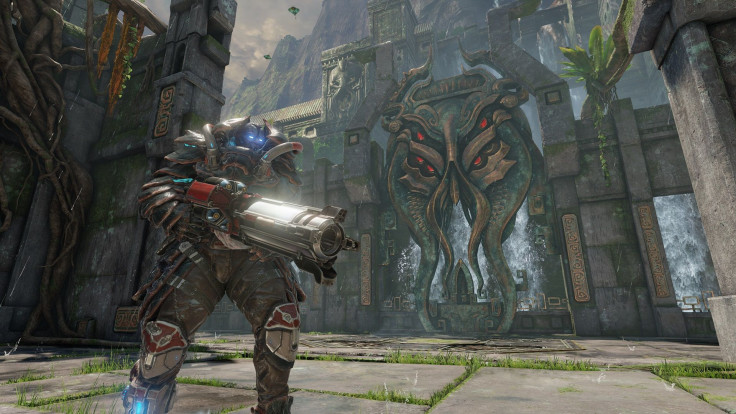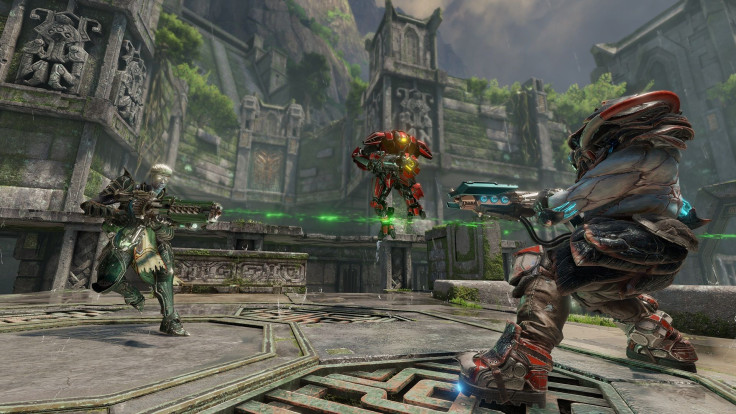To say Quake Champions was one of the biggest surprises at E3 2016 is an understatement. It hadn’t been a month since the release of DOOM, Bethesda had no shortage of other content to talk about — from Dishonored 2 to Fallout VR — and there hadn’t been a major addition to the Quake franchise in 11 years. And yet, here we are.
But how did we get here?
Given the timing of id Software’s Quake Champions announcement, which preceded the first batch of DOOM DLC, it’s clear the studio started work on its Quake revival before anyone knew how critics or consumers would respond to one of 2016’s most celebrated releases. But Quake Champions creative director (former id Software co-owner) Tim Willits says the studio was confident DOOM would find an audience, paving the way for another big reboot.
“The success of DOOM has made doing this much easier,” Willits acknowledged. “But we knew DOOM was going to be cool.”
Confidence in its latest project isn’t the only reason Bethesda is bringing Quake back to market, Willits told us during a sit-down at QuakeCon 2016. It may not carry the weight it once did, particularly among PC gamers, but the franchise still has a fervent fan base. It’s also important to remember how important Quake is to the first-person shooter genre. Who knows if we’d have ever seen modern favorites like Robot Roller-Derby Disco Dodgeball without the masterpiece that was Quake III Arena.
“The IP has a legacy. People know Quake. You can say ‘Oh it’s Quake-style’ and people get it. You don’t have to explain,” Willits continued. “So it’s a great foundation to start with.”
“It may have been a long time but great games and great ideas live on,” he added.
And the chatter that followed Quake Champions’ announcement during Bethesda’s E3 presser suggests Willits isn’t exaggerating. The franchise still enjoys a substantial following, albeit one that’s been quite vocal about its concerns. The most common question id Software has been getting is why the studio is making a Quake MOBA, despite the developers repeatedly insisting that’s not the case. The notion has apparently become so widespread that dispelling it was the primary objective of Willits’ QuakeCon keynote.
What’s interesting is that Quake Champions can’t even claim to have roots as a MOBA. id Software was never looking to capitalize on the growing success of titles like Dota 2 or League of Legends. The game was actually birthed from an idea the Quake Live team had a few years ago, when id was brainstorming ways to draw new players to its (formerly) free-to-play game.
“We had run Quake Live as a free service. It was a free-to-play game since 2008. And in 2013 we were looking at what we could do to expand it,” Willits told iDigitalTimes. “Maybe do a big update. Push more people to it. And so we started coming up with this champion idea.”
“Then we looked at how DOOM was shaping up,” he added. “We had the opportunity to work with Saber Interactive. And we decided this is a whole game. We could [use] modern technology, modern graphics, modern gameplay. We could add all the new things. So we turned [Quake Champions] into a whole game itself.”
Part of the Quake Live team was split off from the main group. Its goal: to conceptualize and eventually begin building Quake Champions, a game the studio hoped would blend the classic arena shooter action popularized by Quake with the new concepts, ideas and technologies mentioned by Willits. And the first Quake Champions gameplay trailer , published during QuakeCon, is helping silence early doubters of the unreleased shooter.
Much of the current criticism is focused on hero abilities. Some players are convinced the skills have no place in an arena shooter and/or id is just trying to capitalize on current market trends by pairing popular game mechanics with an iconic franchise. But Willits believes some fans will change their tune after getting hands-on time with Quake Champions.
“We hope we can win them over,” Willits said. “Our design philosophy is this rock, paper, scissors concept, where the abilities can be countered by other abilities or characters. Like if Scalebearer is rushing Nyx, she can go Ghost Shift, Scalebearer will pass right through her. If Vizor has his Piercing Sight, he can see Nyx when she’s ghost-walked. And then you can shoot down Ranger’s dire orb and things.”

Of course, the Quake Champions team is looking at other ways to appeal to those turned off by the introduction of character-specific abilities. Requests for an ability-free queue have become frequent, despite the fact few in the community have tried the new skills. And id Software seems to at least be receptive to the idea. Even if it can’t or won’t commit to such an offering yet.
“With the cooldowns and things, it really does add a layer of depth and strategy” Willits said. “We’ve had the pro players playing [ Quake Champions ] and we’re gathering their feedback. And we’ll look through all that. But we also have to be careful that we don’t make so many game modes that everybody is playing something different. And we don’t have that critical mass that we need to push this into the competitive sphere. So we haven’t decided whether or not we’re going to do that. But I can tell you it’s been discussed. That question has come up a lot.”
Based on our discussion, it seems safe to assume skill bans won’t be available in Quake Champions when the game enters closed beta next year. That doesn’t mean we’ll never see the option. But it’s probably going to be a while. Willits says id isn’t sure how long it will take to “finish” Quake Champions but fans should expect the upcoming shooter to stay in beta for “a while.” Eventually, testing will transition from a closed pool to an open environment, giving the devs an opportunity to rebalance Quake Champions for a larger audience. But it sounds like the community will play QC long before its complete. And a 2017 launch seems pretty unlikely.
Willits’ closed beta announcement is also generating some strong feelings in the community. Threads have popped up around the web, including the Quake Champions sub-reddit, questioning the decision to only let a percentage of the community into the closed beta. Those upset point to the experience gap seen in the Overwatch community, which spent more than a year in beta, as a prime example of what happens when a select few get more time to learn the intricacies of game prior to launch. We asked if the studio planned to address such concerns, but the creative director was surprised to hear the discussion was even taking place.
“That’s just, like, being sad because you didn’t make it in the closed beta,” Willits said. “That’s just like [feigning sadness] ‘I got beat because I wasn’t in closed beta.’ [returns to normal voice] No, you got beat because he’s better than you.”
“Wow, people are upset by that?” Willits asked. “I mean, look at how successful [ Overwatch ] is. That game is successful because they spent so much time in beta.”
It might not be the response many fans expected, particularly in an era when many gamers are convinced political correctness has somehow taken over the gaming industry. But it also sounds like many of those worried about being stuck on the outside don’t actually need to worry. Willits says previous tests taught Bethesda to send out exponentially more beta invites than it actually plans to host. If the studio wants 1,000 people to participate in the test, Willits says the company distributes somewhere around 10,000 beta invites. So, if you’re a diehard Quake fan, odds are good you’ll have a chance to play Quake Champions before launch.
“Because the design is tight and the scope is focused, we can make the best competitive shooter in this [industry]. We have a laser focus,” Willits said. “But working with fans and the community is critical. Especially for the pro players. If we don’t win those guys we’re dead. So we’re going to listen to what people want and try to make it happen.”

Even with such a positive outlook, it’s hard to ignore the undercurrent of doubt present over the last few weeks. Last week’s gameplay demonstration put many players’ concerns to bed but it hasn’t stopped fans from criticizing the decision to add abilities, accusing id Software of integrating “ wall hacks” and trying to capitalize on market trends instead of appealing to the core Quake audience. But the harassment of content creators, who have the audacity to try something new, isn’t exclusive to the gaming industry.
We asked Willits if the negativity ever left the Quake Champions team feeling like Sean “Jay-Z” Carter, who famously rapped “want my old shit, buy my old albums.” (‘On To The Next One,’ 2009). But Willits says he isn’t ready to write off those who don’t want the franchise to grow. If anything, the existence of such strong opinions is probably why we’re still talking about the Quake series at the 21st annual QuakeCon.
“That’s just the passion of the fans. If we didn’t have passionate fans we wouldn’t have anything,” Willits said. “We’re lucky, if you think about it, to have fans that love it so much that they actually take the time to email us and complain and get all upset about this or that. Real or imagined. But I encourage people to [give feedback]. Because that’s how we’re going to make it good.”
Plus, old music generally still works when you buy it, Willits points out. You don’t have to find a record or cassette player to hear Boogie Down Productions in 2016. Even if you want to listen in the original formats, there are plenty of devices (like USB turntables) on the market that let you revisit old multimedia with new technology. The same can’t always be said for old games.
“I can understand. Sometimes people get worried about things,“ Willits said. “That passion is good. It really is good.”
The Quake Champions team may not be worried about business models at the moment. But Willits says the team is absolutely thinking about ways to keep the game relevant after launch. Unfortunately, despite fan impressions, there’s more to the task than guaranteeing a new member of the roster every few weeks. The timing of those content drops is just as important, especially once the game is out of beta and the competition heats up.
“Our goal is to continue to add champions throughout the life of the product,” Willits said. “Hopefully, that is a long time. But we’re going to be smart about it. We won’t release a champion in the middle of a season. We’re not going to do champion tweaks when there’s a competition going on. But, yes, we want to get into a cadence so we can keep delivering new content.”

New combatants won’t be the only post-launch additions to Quake Champions. Willits says id and Saber want to introduce new weapons, new maps and maybe even some new match types over the life of the game. We’ll also see the balance patches and champion tweaks published for any competitive release. The plan is to return to Quake’s origins, Lovecraftian horror, and get a little weird with the people, places and things we see in Quake Champions.
“The Quake universe is rich and diverse. So we have a lot to pull from,” Willits told iDigi.
Generally, this is the point when the conversation drifts to monetization. Will Quake Champions be free-to-play? Could it find the audience Bethesda is looking for at $60? How will Bethesda raise the money needed for ongoing support when game sales begin to decline?
Everyone has strong opinions about the business side of the industry these days. But the Quake Champions team doesn’t want to focus on those numbers just yet.
“It is really tough to figure out the business plan,” Willits explained. “Because, on one side, you want a lot of people. And then you want people that just want to buy something and never deal with anything else again. ‘I’ll give you some money and then I just want to play my Quake.’ So you have those people. But those people need to play with millions of people. So it’s a really tough balancing act. And what we’ve been doing, our first goal, is make it feel like Quake.”
“Now we’re working on progression and gameplay loops and team game modes. Trying to figure out Duel mode,” he added. “Once we have that, once we’re happy with all these pieces, then we can look at a business model that actually makes those work together.”
But that doesn’t mean Bethesda hasn’t ruled out one or two of its options.
“What I know for certain is that we will not be pay-to-win or [let you] buy power,” Willits said. “We need to even be careful with, if you can buy something, then turn it into something else, then turn it into something else, that you [can’t] eventually get something good. We even have to be careful with those types of things. So it’s no buy-to-win. No buying power.”
What was that about turning something into something else, you ask?
Don’t worry, we did too.
“Without getting into too much specifics, because, again, it’s not totally working yet, we want to keep giving you stuff,” Willits said. “But we know you may already have stuff. So what do we do when you get something you don’t need?”
So Quake Champions will probably include a loot system. Obviously, that begs a variety of other questions, like ‘Will it be like the loot boxes in Overwatch ?’, ‘Will it have keys like Team Fortress 2?’ or ‘Will there be item crafting and/or recycling?’ Unfortunately, other than sort-of confirming players might be able to earn performance-enhancing equipment — just not buy it — Willits declined to say much more about potential item distribution mechanics in Quake Champions .
“We do want to have something like that but it’s just too hard to talk about now because we haven’t quite worked it all out,” Willits added. “One thing, as a game designer, you have to realize that, with 10 game ideas you come up with, nine of them are really bad. So try not to talk about those nine before you know they’re really good.”
Which, of course, brings us to eSports. The 800 lb. gorilla in any room where some combination of developers, fans, publishers and reporters are talking about the long-term potential for a new game. Willits acknowledged his (and the team’s) desire to see Quake Champions become a fixture on the competitive gaming landscape. But it sounds like Bethesda will take an approach somewhere between Riot and Valve when building a competitive scene.
“Bethesda, as a publisher, definitely wants, and they’ve talked about this, to grow their eSports initiative. Push the games that make sense as eSports platforms. And Champions will definitely be one of those games,” Willits said. “But the Quake franchise has always been a community event type of thing. So we do want to give people the opportunity to run their own tournaments. If you have a league, and you have a whole bunch of people in it, and you want to introduce this game, we’ll work together.”
Be sure to check back with iDigitalTimes.com and follow Scott on Twitter for more Quake Champions news throughout its development cycle and however long id Software supports Quake Champions in the months following launch.


















